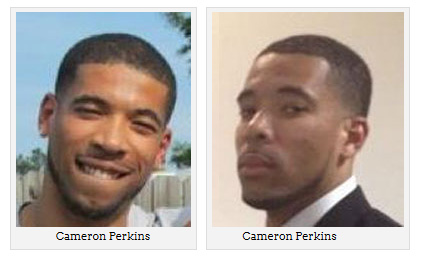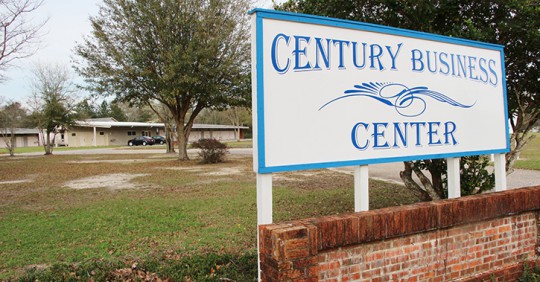Chiefs’ Lambert, Newsome Sign Letters Of Intent
May 1, 2015
Two Northview High School seniors signed football letters of intent Thursday. Cameron Newsome (right) signed with Waldorf College in Iowa, and Nick Lambert signed with Faulkner University in Montgomery. NorthEscambia.com photos, click to enlarge.
Escambia Corrections Officer Wanted For Armed Robbery
May 1, 2015
Police are searching for a man identified as an Escambia County Corrections officer in connection with the armed robbery of a pharmacy.
 A warrant has been issued for Cameron Tristan Perkins, 29 who is wanted for armed robbery, kidnapping, grand theft of a controlled substance, using a firearm during a felony, trafficking in opium or derivative, and committing a second degree felony wearing a mask or hood.
A warrant has been issued for Cameron Tristan Perkins, 29 who is wanted for armed robbery, kidnapping, grand theft of a controlled substance, using a firearm during a felony, trafficking in opium or derivative, and committing a second degree felony wearing a mask or hood.
The incident occurred around 3:35 a.m. on April 19, at CVS, 6888 N. 9th Ave. Two masked suspects forced an employee to give them narcotics at gunpoint. The employees were then forced at gunpoint into a bathroom before the suspects fled.
Derick Cannon, 31, of 1724 Dauphin Road, Pensacola, and Shawn Cannon, 29, of 4301 Creighton Road, Pensacola, were both arrested Wednesday in connection with that incident. The brothers face the same charges as Perkins and have also been charged with an additional robbery of the same CVS that occurred July 22, 2014. Narcotics were also stolen at gunpoint in that incident.
The on-going investigation is a concentrated effort involving numerous Pensacola Police officers and law enforcement officers from the Escambia County Sheriff’s Office; Bureau of Alcohol, Tobacco and Firearms; and Gun Crime Response Team. Detective Pat Bradley is heading up the investigation from the Pensacola Police Department.
The suspects also are being investigated by the Escambia County Sheriff’s Office and the Milton Police Department for similar incidents.
Detectives have contacted Perkins’ employer and family members asking their assistance in persuading him to turn himself in. Perkins is considered armed and dangerous.
Anyone having information on Perkins is asked to call Crime Stoppers at (850) 433-STOP.
Photos: Ransom, Ernest Ward Track
May 1, 2015
 Ransom, Ernest Ward and Workman middle school met in a track meet Thursday afternoon in Cantonment. Results were not immediately available.
Ransom, Ernest Ward and Workman middle school met in a track meet Thursday afternoon in Cantonment. Results were not immediately available.
NorthEscambia.com photos, click to enlarge.
Ten Big Issues As Regular Session Ends
May 1, 2015
Ordinarily, the last week of the annual legislative session is a blur of deal-making, with bills bouncing back and forth across the Capitol’s fourth floor. But with the House adjourning Tuesday amid a battle with the Senate about budget and health-care issues, the 2015 session will be remembered for its messy end — and the piles of bills that died in the crossfire. Lawmakers will come back sometime in May or June for a special session to negotiate and pass a budget. But with the 60-day regular session formally ending Friday, here is where 10 major issues stand:
BUDGET: At some point, lawmakers will pass a budget for the fiscal year that starts July 1. They don’t have a choice. But the Republican-dominated House and Senate remain more than $4 billion apart in their budget proposals and have not started the formal process of trying to come to agreement. While the House and Senate always have budget differences, this year’s standoff focuses almost exclusively on health care. Lawmakers don’t know whether the federal government will extend a $2.2 billion program known as the Low Income Pool, which is scheduled to expire June 30 and plays a key role in helping hospitals care for poor and uninsured patients. Meanwhile, the Senate wants to use $2.8 billion in federal Medicaid money to offer health insurance to hundreds of thousands of lower-income Floridians — a non-starter for the House.
CHILD WELFARE: After passing a major overhaul of the child-welfare system last year, lawmakers finalized a bill (SB 7078) this week that might be best-described as tweaking the system. As an example, the bill could expand the role of the state’s Critical Incident Rapid Response Team, which the secretary of the Department of Children and Families can dispatch to investigate child deaths. As another example, the bill tries to give priority to types of services that are “evidence-based and trauma-informed” — a more child-centered approach based on the idea that abused kids can recover by addressing the experiences they’ve endured, such as family violence or addicted parents. Even with the overhaul last year, however, the state has continued to grapple with tragic incidents such as the death of a child who was dropped off a bridge into Tampa Bay and the death of a Hollywood child whose body was found wrapped in garbage bags and hidden in a laundry room.
GAMBLING: In early April, Senate Regulated Industries Chairman Rob Bradley, R-Fleming Island, offered a narrowly tailored plan to extend for one year a gambling deal with the Seminole Tribe of Florida. The plan would have allowed tribal casinos to retain exclusive rights to offer banked card games, such as blackjack, in exchange for the Seminoles paying more than $100 million to the state. But by the end of session, gambling bills had collapsed in the House and Senate as various gaming interests looked to get a piece of the action. Ideas ranged from allowing resort casinos in South Florida to lifting a requirement that greyhound tracks run live races, effectively allowing them to focus on offering lucrative card rooms. Both of those ideas were included in a House plan floated by Majority Leader Dana Young, R-Tampa. The collapse of the bills left unresolved what will happen with the Seminole Tribe, as a current card-game deal is scheduled to expire this summer.
GUNS: With memories of a November shooting at Florida State University fresh in their minds, lawmakers this session waded into an emotional debate about allowing people with concealed-weapons licenses to carry guns on college and university campuses. Supporters said more people carrying guns would improve campus safety, while opponents said it would create dangers. In the end, the proposal died quietly, as the Senate Judiciary Committee did not take it up. Also, the Senate Education Pre-K-12 Committee scuttled another controversial proposal that would have allowed school superintendents to designate trained employees or volunteers to carry guns at public schools. Second Amendment supporters, however, gained a victory when the House and Senate passed a bill (SB 290) that would allow more people to carry weapons during mandatory emergency evacuations. The measure would allow people to carry guns without concealed-weapons licenses for 48 hours during such evacuations.
HEALTH CARE: As the keys to the budget impasse between the House and Senate, the Low Income Pool and the Senate plan for expanding health coverage overshadowed all other issues during the session. The outcomes of those issues during a special session will have huge financial ramifications for the state. But they also have huge ramifications for hospitals and low-income patients and pose a political dilemma for Republican lawmakers and Gov. Rick Scott. With the LIP program scheduled to expire June 30, all sides will be watching to see if the state can work out an extension with the federal Centers for Medicare & Medicaid Services. The alternative could be funneling hundreds of millions of dollars in state tax money into the health-care system. Meanwhile, the Senate coverage plan would use Medicaid money available under the Affordable Care Act, better known as Obamacare, to offer private health insurance to about 800,000 people. The Senate argues a coverage expansion is important, at least in part, because of the potential loss of LIP money. But the House and Scott adamantly oppose the Senate plan, arguing that the federal government can’t be trusted and that Florida could get saddled with the expansion costs in the future.
LAND AND WATER: The House passed its version of a water-policy bill during the first week of the legislative session. The Senate passed its version during the final week. But the two chambers never came to agreement on the issue, which House Speaker Steve Crisafulli, R-Merritt Island, has made a priority. Also unresolved is how lawmakers will carry out a voter-approved measure, known as Amendment 1, that requires the state to set aside hundreds of millions of dollars a year for land and water projects. Environmentalists have criticized initial proposals from the House and Senate, arguing that more money should go to the Florida Forever land-conservation program and to Everglades restoration efforts. But Republican leaders in both chambers have suggested the state needs to focus on managing property it already owns instead of amassing more. Carrying out Amendment 1 could be a closely watched part of a budget special session.
PRISONS: For the past year, the Florida Department of Corrections has faced a barrage of allegations about inmate deaths, cover-ups and poor working conditions in the prison system. That led Senate Criminal Justice Chairman Greg Evers, R-Baker, to lead a review that went so far as to include unannounced visits to prisons and taking sworn testimony during a committee meeting. But lawmakers went home this week without reaching agreement on reforming the system. The House and Senate differed on issues such as a Senate proposal to create an oversight commission to investigate prison wrongdoing. Nevertheless, Senate President Andy Gardiner, R-Orlando, said he will put a Senate committee on the road to investigate problems in the system.
STADIUMS: Gardiner left no doubt before the session started that he supported using state sales-tax dollars to help build a soccer stadium in Orlando. That could be considered, in the words of the late Senate President Jim King, some “home cooking.” But with key House leaders opposed, funding for the Orlando stadium and three other professional sports venues barely became an issue during the regular session. The other projects are at EverBank Field in Jacksonville, Daytona International Speedway and Sun Life Stadium in Miami-Dade County. Late in the session, an amendment was attached to a Senate economic-development bill that would have provided money for the projects, but the bill did not get heard in the full Senate.
TAX CUTS: Scott proposed an ambitious $673 million in tax cuts this year, only to get slightly trumped by a $690 million tax-cut package offered in the House. But with the budget picture unresolved, tax cuts remain in limbo. Senate committees moved forward during the session with a series of bills that would have cut taxes, but Senate leaders never offered a full package. What’s more, if lawmakers have to use state money to make up for reductions in the LIP program, that could limit the amount of tax cuts they can offer. Scott’s biggest proposed cut would be a $470 million reduction in the communications-services tax, which is collected on such things as cell-phone and cable-television services. But lawmakers have also considered a series of other ideas, such as trimming a tax on commercial real-estate leases and providing a back-to-school sales-tax holiday.
TESTING: Amid all the ill will this session, the House, Senate and Scott found common ground on school testing. Lawmakers passed — and Scott quickly signed — a bill (HB 7069) aimed at reducing the number of tests given to public-school students. The issue has become high-profile during the past year and gained momentum when technology troubles caused widespread problems as students started taking the new Florida Standards Assessments. The bill, in part, puts a hold on the use of student test data for school grades, teacher evaluations and student promotion to fourth grade until the Florida Standards Assessments can be independently validated. It also scraps a law requiring school districts to come up with end-of-course tests in classes where the state doesn’t administer such exams. Also, it caps the amount of time students can spend on state and school district tests at 45 hours a year and reduces the portion of a teacher’s evaluation tied to student performance.
Free Small Business Workshops Available In Century
May 1, 2015
As part of Century’s ongoing economic development efforts, the town has partnered with the Small Business Development Center at UWF to host a free “Amplify Your Business Through Fundamentals” training series for businesses in Century and the surrounding area.
All workshops are free to the general public but pre-registration for each workshop is recommended through the SBDC’s website. Attendees may pick and choose the workshops that will be most beneficial to them. All workshops will be held at the Century Business Center at 150 East Pond Street from 9 am. until noon on the dates below:
Tuesday, May 5
Marketing I – Winning with Social Media: Learn practical, cost-effective strategies for marketing your small business. Not sure where to begin with social media or why you should bother? Businesses of all sizes are using online tool like Facebook, Twitter and Constant Contact to connect with customers. Let us show you low-cost ways social media can bolster your current marketing efforts and you will leave with your own social media marketing plan. Learn which social media tools are a good fit for you, where your target customers are looking online, and what it could mean for your business if you are not involved in social networking.
Thursday, May 7
Marketing II – Using Google Tools and Boosting Your Business with Great Customer Reviews: If you have heard of Google Ad Words, Alerts, or Analytics and wonder how they could benefit your marketing efforts, this workshop is for you! Learn how to track website visits, research keywords, find articles relevant to your business, and most importantly, manage your brand online. In addition, customer reviews through online sites such as TripAdvisor and Yelp are crucial to the success of a small business. Don’t overlook this vital tool for marketing your small business. Discover the various online customer review sites, how to create compelling business listings for the most popular sites, and tips for getting great customer reviews.
Tuesday, May 12
Financial & Cash Flow Statements, Pt. 1: Learn how to create and use profit and loss statements, balance sheets and cash flow statements to manage a small business.
Thursday, May 14
Financial & Cash Flow Statements, Pt. 2
Tuesday, May 19
Human Resources: This training will provide an overview of the many aspects of human resources management. During this session, we will provide training on the following topics: Fair Labor Standards Act, effective recruiting, effective hiring, drug testing, employee motivation, costs of employee turnover, and effective communication.
NorthEscambia.com file photo.
Wahoos Halt Three-Game Skid
May 1, 2015
The Pensacola Blue Wahoos ended a three-game losing streak by beating the Jackson Generals in the opener of a five-game series.
Pensacola scored two runs in the second inning to go ahead, 2-1, and added another run in the fifth inning for a, 3-1, victory over host Jackson.
Marquez Smith, who went 2-4, doubled to open the second inning and scored on Ray Chang’s groundout to tie the game, 1-1. Then, Juan Silva singled on an infield hit to shortstop that scored newly added catcher Cam Maron for a 2-1 lead.
Pensacola added an insurance run in the fifth when Jesse Winker, the Cincinnati Reds No. 4 prospect, led off the inning with a triple to center and scored on a double by Kyle Waldrop to centerfield to go ahead, 3-1. Waldrop extended his hitting streak to five games and is now 7-20 (.350) during his streak.
Jackson had taken the lead, 1-0, in the bottom of the first when they loaded the bases with two outs and Zach Shank scored on a wild pitch by Sampson.
Layne Somsen, who won Sunday’s spot start against Biloxi, pitched three scoreless innings of no-hit ball and struck out two for his second win of the season. Ben Klimesh struck out two in the ninth for his fourth save of the year.
Bridge Construction Cuts Phone, Internet Service
April 30, 2015
Construction work on a temporary bridge on Highway 97 in Walnut Hill left thousands without phone or high speed internet service Wednesday.
 Wednesday afternoon, a fiber optic cable was cut in the construction zone near Wiggins Lake Road, taking out service for Frontier Communications customers in the 327 and 587 exchanges, including Walnut Hill, Molino, Davisville, Dogwood Park and Bratt. Service was restored by about midnight.
Wednesday afternoon, a fiber optic cable was cut in the construction zone near Wiggins Lake Road, taking out service for Frontier Communications customers in the 327 and 587 exchanges, including Walnut Hill, Molino, Davisville, Dogwood Park and Bratt. Service was restored by about midnight.
As a precaution, Escambia Fire Rescue volunteers were one standby at the Walnut Hill and Molino fire stations during the outage — just in case someone with an emergency was unable to call 911 and instead called a local number for a fire station or drove up to report an emergency.
Sunny Days, Cooler Nights
April 30, 2015
Here is your official North Escambia area forecast:
Thursday Night
Mostly clear, with a low around 51. Northwest wind around 5 mph.
Friday
Sunny, with a high near 76. North wind 5 to 10 mph.
Friday Night
Mostly clear, with a low around 49. North wind around 5 mph.
Saturday
Sunny, with a high near 78. North wind around 5 mph becoming calm.
Saturday Night
Mostly clear, with a low around 52. Calm wind.
Sunday
Sunny, with a high near 81. Calm wind becoming south around 5 mph in the afternoon.
Sunday Night
Mostly clear, with a low around 58. South wind around 5 mph.
Monday
Mostly sunny, with a high near 82.
Monday Night
Partly cloudy, with a low around 59.
Tuesday
Mostly sunny, with a high near 83.
Tuesday Night
Partly cloudy, with a low around 61.
Wednesday
Mostly sunny, with a high near 84.
Recovery Report: Escambia County One Year After The Flood
April 30, 2015
by Escambia County Administrator Jack Brown
One year ago, a slow-moving weather front flooded Escambia County with more than 20 inches of rain in less than one day. When the rain ceased, recovery began and is still in progress today.
County estimates of damage to government infrastructure and buildings topped a staggering $90 million with transportation, utilities, parks and public facilities all significantly impacted.
Although the road to recovery seemed daunting, County staff and residents banded together to rebuild. In the days immediately following the flood, Public Works crews removed more than 280 tons of debris and pumped one million gallons of water out of neighborhoods that were too waterlogged to drain. Major flood-damaged roads were quickly reopened and hard-hit communities such as Crescent Lake and the neighborhoods off of Old Corry Field Road are in visibly better shape today than they were just six months ago.
Despite the progress, the long-term effects of the disaster on Escambia County are still being felt in our community. While some residents continue to recover from the devastation to their homes and the loss of cherished belongings, others face the unimaginable struggle of coping with the loss of life suffered during April’s tragic events.
We are focused on rebuilding Escambia County stronger and better. But this is not a sprint – it’s a marathon. Destruction from the April flood resulted in 2,318 identified infrastructure damage sites. All of those identified sites have been addressed in some way; either through a temporary or permanent fix, or are currently under some form of construction. However, many large-scale public construction projects involve a much longer timeframe for repair.
Escambia County was able to move quickly to return our streets, parks and facilities to near-normal conditions on our own, without having to wait for federal assistance thanks to the confidence residents placed in us with the passage of the Local Option Sales Tax (LOST). That support, coupled with responsible financial management of taxpayer money exercised by the Board of County Commissioners, allowed the Board to authorize a $10 million interest-free loan from the LOST III Fund to the Disaster Recovery Fund to kick-start recovery efforts.
The County is leveraging those funds by working with an alphabet soup of federal agencies to help pay the cost of repairs. These agencies include: the Federal Emergency Management Agency Public Assistance (FEMA-PA), the Federal Highway Administration Emergency Relief Program (FHWA-ER) and the US Department of Agriculture’s Natural Resources Conservation Service (NRCS) Emergency Watershed Protection (EWP) program. With any of these agencies, the County must undergo a multi-step process to obtain reimbursement or grants to help pay for eligible damages. To date, 89 projects valued at $10.3 million have been approved for FEMA-PA. Of those, 23 projects totaling $4 million have been completed. Sixteen FHWA-ER projects have been completed at a total cost of $2.5 million. Additionally, the NRCS-EWP recently made $3 million in funding available to complete the following seven projects:
- Crescent Lake: $674,531 to fix the breach in the lake’s embankment and to install an emergency spillway.
- Gatewood Ditch: $350,790 to fill the eroded area and replace 1,700 feet of concrete-lined ditch.
- Olive Road: $198,671 to install a concrete box, pipe-drop structure and a water and sediment control basin to stabilize the head of the gully and safely discharge storm water.
- Glyn Brock Gully: $206,657 to remove sediment and debris from the stream channel and ditch and repair the eroded area with rock riprap.
- Addison Drive: $91,868 to remove sediment and debris from the landslide, grade the slope and install a system to move water to the outlet.
- Ten Mile Creek: $1,377,175 to stabilize the channel and protect Pine Forest Road Bridge, nine homes and eight townhouses from further erosion and potential collapse.
- Swamphouse Road: $83,440 to re-grade the side slope, plant sod and remove sediment and debris from the channel.
In an effort to protect residents from destruction of this magnitude again, the County established the Storm Water Advisory Team (SWAT), a multi-disciplinary approach to storm water recovery that encourages engagement from technical experts, the City of Pensacola and a citizen’s committee to identify and institute mitigation and resiliency initiatives.
Furthering their commitment to embedding community resilience into our approach to flood risk management, our County Commission recently approved stronger development codes that require new construction, as well as conveyance systems, to attenuate the 100-year storm event.
Even prior to last year’s flood, the County made significant storm water improvements to several neighborhoods. Areas such as Ferry Pass and Maplewoods that had traditionally experienced flooding faired far better in April’s storm after the recently completed drainage projects. As we move forward, we cannot forget the losses suffered. However, our focus now is on how we can enhance our ability to withstand future events, and help those still at risk of flooding to mitigate potential impacts. ‘Back to normal’ shouldn’t mean burying our heads in the sand and crossing our fingers that flooding won’t happen. ‘Back to normal’ should mean establishing a new standard where our resilience as a community and as individuals is improved, so that we’re all better prepared when flooding next happens.
Florida Senate Weighs Legal Action Against House
April 30, 2015
Senate leaders are considering legal action to try to force the House to return to the Capitol to finish out the work week as the slow-motion collapse of the regular legislative session appeared to near its end Wednesday.
With the Senate completing the business it could after the House’s abrupt decision to leave town Tuesday amid a health-care and budget dispute, Senate President Andy Gardiner, R-Orlando, sent a letter asking House Speaker Steve Crisafulli, R-Merritt Island, to call House members back to Tallahassee.
Gardiner cited an obscure portion of the state Constitution saying that “(n)either house shall adjourn for more than seventy-two consecutive hours except pursuant to concurrent resolution” — meaning, he said, the House could not end its session on Tuesday without the Senate’s consent.
“The course of action you have taken is not only unconstitutional; it is unprecedented under our present state Constitution,” Gardiner wrote.
The Senate will be ready to return to session up until 11:59 p.m. Friday, Gardiner said, though there appeared to be no plans for the upper chamber to return if the House does not. If the Senate does not formally return for a final adjournment, the session would lapse at 11:59 p.m. without ceremony.
The House and Senate have not ended a regular legislative session on different days since at least 1971, when state records on adjournment times begin.
Crisafulli swiftly responded to Gardiner’s letter with one of his own. The House, he said, isn’t returning.
“We can have disagreements on policy issues, each year the House and Senate have plenty,” the speaker wrote. “At the end of the day, if the two sides don’t agree, bills die. That is how the process works.”
The House says the 72-hour provision doesn’t apply to adjourning “sine die” — from the Latin phrase for “without day” — the official end of the legislative session.
“This provision deals with temporary adjournment during session, not adjournment sine die. … They are separate parliamentary procedures, initiated by distinct motions,” House general counsel Matthew Carson wrote in an explanation sent to reporters Tuesday.
Speaking with reporters after Wednesday’s session, Gardiner said the Senate is considering taking the House to court to resolve the dispute — even if it didn’t end the current standoff between the two.
“I think that that’s why at some point, whether it’s this week or in the future, there will need to be a discussion before a court to exactly interpret what that is,” Gardiner said. “We certainly believe that they have an obligation to be here.”
Senate Appropriations Chairman Tom Lee, R-Brandon, conceded that it’s “unlikely” the Florida Supreme Court would rule on the issue before the Friday deadline.
But Senate leaders say the state needs to set a precedent because an early adjournment could again be used as a negotiating tactic in the future.
“The importance of all of this is to keep one house from leveraging the other house,” said Senate Rules Chairman David Simmons, an Altamonte Springs Republican and a lawyer. “In other words, the important work of the people of the state of Florida demands that we both stay here for the full time period that has been given us to accomplish the task that we have at hand.”
The current, increasingly bitter rift between the House and Senate, both of which are dominated by Republicans, has grown out of the June 30 expiration of the state’s $2.2 billion Low Income Pool, or LIP, program. LIP is largely used to cover the expenses of uninsured, low-income Floridians who show up at hospitals needing treatment.
The Senate wants to use $2.8 billion in Medicaid expansion funding to help lower-income Floridians purchase private health insurance. Supporters of Medicaid expansion, including the federal Centers for Medicare & Medicaid Services, say that could help lessen the state’s dependence on LIP.
Federal officials have also suggested that how much the state gets in LIP will be affected by how much of that funding could be offset if the state expanded Medicaid.
House members touted a new statement from CMS spokesman Aaron Albright, issued late Tuesday, which they said marked a reversal of the federal agency’s previous position — in a letter dated April 14 — that LIP and Medicaid expansion are linked.
“We will work with Florida and each state that has an uncompensated care pool regardless of its Medicaid expansion status, to support access to health care for low-income residents that works for individuals, hospitals and taxpayers, taking into account the state’s specific circumstances,” Albright said Tuesday. “CMS will review proposals regarding uncompensated care pools based on the same principles whether or not a state has expanded Medicaid.”
On Wednesday, Crisafulli credited a lawsuit filed by Gov. Rick Scott to force the decoupling of the issues for the purported change of heart.
“We applaud CMS for their statement, and agree that the (Medicaid) policy preference of the Obama administration should not be used as leverage for the Low Income Pool,” he wrote in a memo to House members.
But Gardiner and other supporters of a Medicaid-funded coverage expansion said the statement Tuesday was nothing new.
“Obviously, some over there (in the House) are trying to pounce on that,” he said. “But I think if you read a little bit deeper down, it really doesn’t say anything different than what the April 14 letter did.”
With the two chambers at odds, Gov. Rick Scott’s office released the draft of an outline for work to be done by his proposed “Commission on Healthcare and Hospital Funding,” which Scott said he would announce if a special session was required to break the budget impasse between the House and Senate. Such a special session will be needed before the July 1 start of the state fiscal year.
Scott, a former chief executive at a for-profit hospital chain, wants the commission to consider financial data, medical education, contributions to hospital foundations, patient data, taxes and salaries and benefits for hospital executives, lobbyists and lawyers.
The panel would consider some of the same information about insurance companies.
Aside from calling for a “continuation budget” if the House and Senate couldn’t reach an agreement — something Senate leaders quickly rejected — Scott, who opposes Medicaid expansion, has largely kept his distance from the House-Senate tussle.
Asked Wednesday if Scott should have played a larger role, Gardiner responded tersely: “You’d have to ask him.”
Democrats in both chambers have worked to suppress their glee as GOP lawmakers go to war with each other. House Democrats held their usual pre-session meeting Wednesday, saying they were ready to work if necessary.
Senate Minority Leader Arthenia Joyner, D-Tampa, issued a statement late Wednesday blasting House leaders and backing Gardiner in the health-care fight.
“Once negotiations begin to convene a special session to reach a budget compromise, I urge the Senate to remain committed to our healthcare expansion plan,” she said. “Because standing alongside you are not only the voices of Republican and Democratic senators — along with House Democrats — but the voices of 1 million Floridians looking to you to stand strong for them. Do not let them down.”
by Brandon Larrabee, The News Service of Florida. Senior writer Dara Kam contributed to this report.











